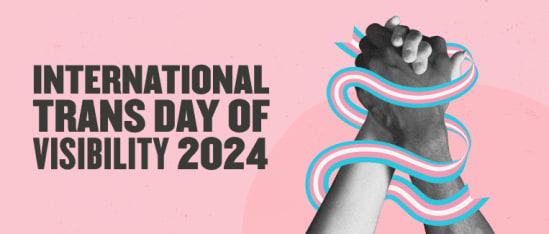The compliance landscape is constantly changing, and depending on where you live—country, state, city, province—laws that offer marginalized and underrepresented people protection against discrimination can change overnight. For HR leaders, this isn’t just an issue of staying on top of the ever-changing compliance landscape. It means thinking about how you can ensure your employees feel safe, protected, and welcome at work, regardless of how they identify.
Today is International Transgender Day of Visibility, a day that celebrates transgender people, recognizes our contribution to society, and brings awareness to the continuing discrimination we face worldwide. And unfortunately, in 2024, there’s a lot of bias and hate to call attention to.
In the United States, lawmakers in 41 states have introduced over 500 anti-trans bills targeting the rights and freedoms of members of our community. Some proposed bills go so far as removing the right to legal recognition for trans and non-binary people, prohibiting us from updating our driver’s licenses, holding public office, or using public bathrooms. Many of these bills also aim to restrict access to gender-affirming health care for trans and non-binary people.
At the end of last year, in the UK, courts blocked a Scottish bill that would have allowed people over 16 to change their gender on government-issued IDs. Legal protections may look a little more robust in Europe, but incidents of hate speech are on the rise, especially as parliamentary debates about gender-affirming health care and other critical topics continue in countries like Denmark, Finland, Portugal, and the Netherlands.
Across the globe, violence and discrimination against trans and non-binary folks are on the rise, and the laws protecting us—at home, at work, and in public—are being stripped away. As someone who identifies as a queer, non-binary, trans, and disabled person—and who lives my identity loud and proud in every moment—this subject is near and dear to me, especially as we observe this year’s International Transgender Day of Visibility.
Genuine inclusivity makes all the difference
A year ago, I joined HiBob as CMO. My work anniversary (or “Bobiversary,” as we call it) is right around Trans Day of Visibility and I’m grateful that this pairing allows me a unique time to reflect every year on what it means to be a proud, visible member of this community.
I’ve loved the first year of my journey with HiBob in part because the HiBob community does what we say we will do: celebrate me and people like me, treating inclusivity like a journey, not a destination. I feel very seen and very welcome. I can be my authentic self. And it’s made all the difference.
Inclusivity, authenticity, and belonging are pillars of our incredible community and company culture. We make an effort to make everyone feel welcome and included, especially the marginalized and underrepresented folks in our organization. We’re not perfect, but we listen and learn from our experiences so we can grow through what we go through together. We even made it one of our values!
Now more than ever, don’t wait
In situations like the one the world is facing today, we as leaders can’t wait for the law to protect our employees—especially when the law is moving in the opposite direction in so many places around the globe. It’s up to us to create a safe, welcoming, inclusive, and authentic environment where everyone can really bring me and win as we.
This is a unique opportunity for HR folks to step up and make an enormous difference not just to folks who may be facing discrimination in all aspects of their life but also to an extraordinarily skilled and talented group of people who are often passed over and even excluded from the workforce.
Talent is equally distributed in our world, but opportunity is not
We’re all talking about the need for top talent, the limited supply of top talent, and the ongoing war for talent. Today’s workforce is more diverse than ever before, and top talent comes in all shapes, colors, sizes, and identities. Trans and non-binary folks are smart, talented, creative, and highly skilled. You want to recruit, engage, and retain us.
But you’ll lose us if we don’t feel safe and included in the workplace. You’ll lose us, along with our talent, expertise, and tacit domain knowledge, to companies that recognize and celebrate us for who we are and the talent we have. Prioritizing DEI&B is a must.
Focus on what matters
Everyone wants an engaging workplace that offers opportunities to learn and grow. But for trans and non-binary folks, we also worry about physical safety, emotional wellbeing, and discrimination in many forms—both in our day-to-day and across important milestones in the employee lifecycle. We want to be safe, to be seen for who we are, and to be treated respectfully, whether that is on our nametags or in our performance reviews.
These concerns aren’t theoretical. Only 32 percent of trans folks report being fully out at work, and only one-third of those report feeling safe. We’re being threatened every day, sometimes with our lives. And in some cases, the right of people to intimidate and bully us is protected by law.
For example, I can’t attend events in the state of Florida because doctors in Florida have the legal right to deny medical care to trans and non-binary patients.
As employers, we are responsible for being proactive and protecting our trans and non-binary team members. We can do more as companies and organizations to make sure that everyone feels safe and protected—and that they belong—even if legal protections are in flux.
So don’t wait to protect, engage, and create a sense of safety and belonging for top talent. Don’t wait for countries, states, provinces, or local governments to protect your people. Put policies in place that create a safe space for everyone in your organization, regardless of where they come from or how they identify.
Recommended For Further Reading
Be persistent about diversity, equity, inclusion, and belonging
Since joining HiBob a year ago as CMO, I’ve talked about how inclusion is a journey and not a destination. This is even more important today because of the world around us.
As people-centric organizations and HR leaders, we’re the role models people look up to. We set the example for people-first, safe, inclusive cultures of belonging for our people, especially for folks who are constantly being targeted. This is why we need to persist in our fight for DEI&B, now more than ever.
The most important thing, though, is not to give up. More than anything, those of us who are able to stand up for people’s rights must stand up. We must stand as role models and protectors of underrepresented and marginalized groups everywhere, all year round.
Be vocal. Be visible. Be proud.
As someone who identifies as trans and non-binary, it’s important for me to be an example of change and to be honest about my experiences.
As a CMO, I am afforded so many incredible opportunities to be visible—on webinars, on panels, at events—and to speak to so many people around the world. And without fail, every time I stand up in front of people, someone comes up to me afterward and tells me they’ve never seen a person who looks like me in a leadership position or on a stage.
They tell me they didn’t know a career path like mine was possible for them, and until seeing me, they thought identities like ours would prevent them from ever being successful. They tell me about their trans and non-binary kids, partners, friends, and family members and how they can’t wait to tell them about meeting me. It’s an incredible honor.
So, on International Transgender Day of Visibility 2024, I’m here to tell you that folks like me have a future and that we’re so much more than the media cycle. We are your friends, neighbors, your co-workers, and your peers. We matter, we exist, and we persist. And I believe that together, we can work to ensure that our talent doesn’t disappear.

From Sarah Reynolds (they/them)
Sarah (they/them) is Chief Marketing Officer at HiBob. An openly non-binary executive, Sarah writes widely about diversity and inclusion, pay equity, the future of work, and the intersection of bias, ethics, and technology. They love spicy food, and can frequently be found in their garden tending to their many varieties of hot chili pepper plants.

